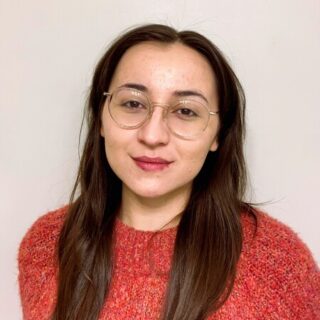Formed in June 1972, the Atlanta Lesbian/Feminist Alliance (ALFA) was established to increase lesbian visibility and solidarity, and to provide means for women to exist outside of society’s sexist institutions. It’s founders included Diana Kaye, Elizabeth Knowlton, and Vicki Gabriner.
ALFA held early meetings at 128 Pine Street, but in October 1972 members established a headquarters at 1190 Mansfield Avenue. This communal house hosted ALFA activities, while the upper floor was home to three ALFA members. ALFA later moved to a house on McLendon Avenue. In September 1972, ALFA members voted to restrict membership to lesbians, changing the organizations name from Atlanta Lesbian/Feminist Alliance to Atlanta Lesbian Feminist Alliance. Members, such as Elizabeth Knowlton, however, noted that no woman who wanted to join ALFA was forced to state or prove herself a lesbian. If they followed the rules, especially not bringing men to any meetings, then all women were welcome.
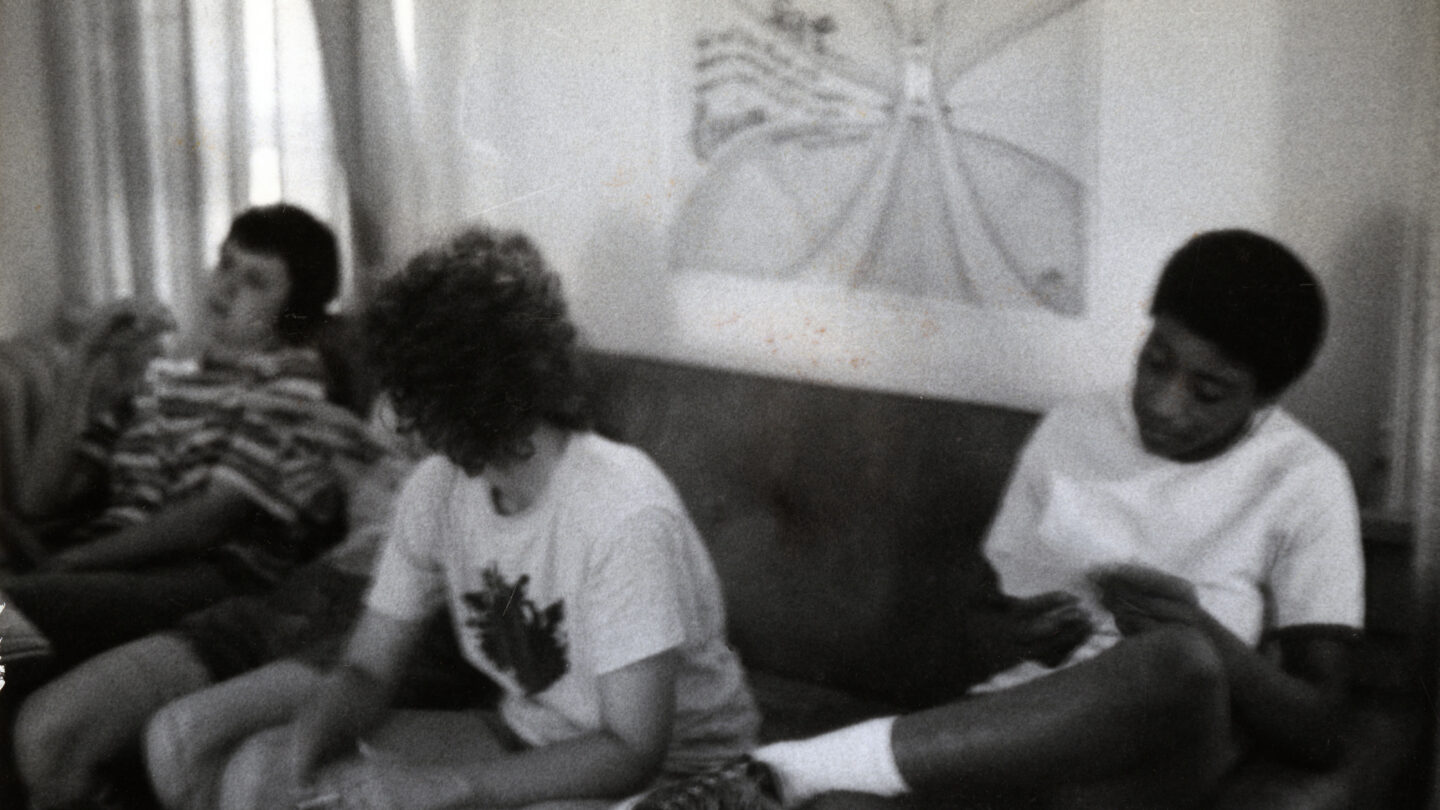
Women at ALFA House on McClendon Avenue, 1974, Pamela Parker photographs, VIS 413, Kenan Research Center at Atlanta History Center
ALFA’s goals included building a library for lesbian literature and publications, as well as to form a softball team for lesbians. The organization also joined with political and civic organizations in Georgia to pressure state lawmakers to ratify the Equal Rights Amendment (ERA) which the United States Senate passed in 1972. In May 1973, ALFA and members of the Socialist Worker’s Party launched Georgians for the ERA, which organized its own marches.
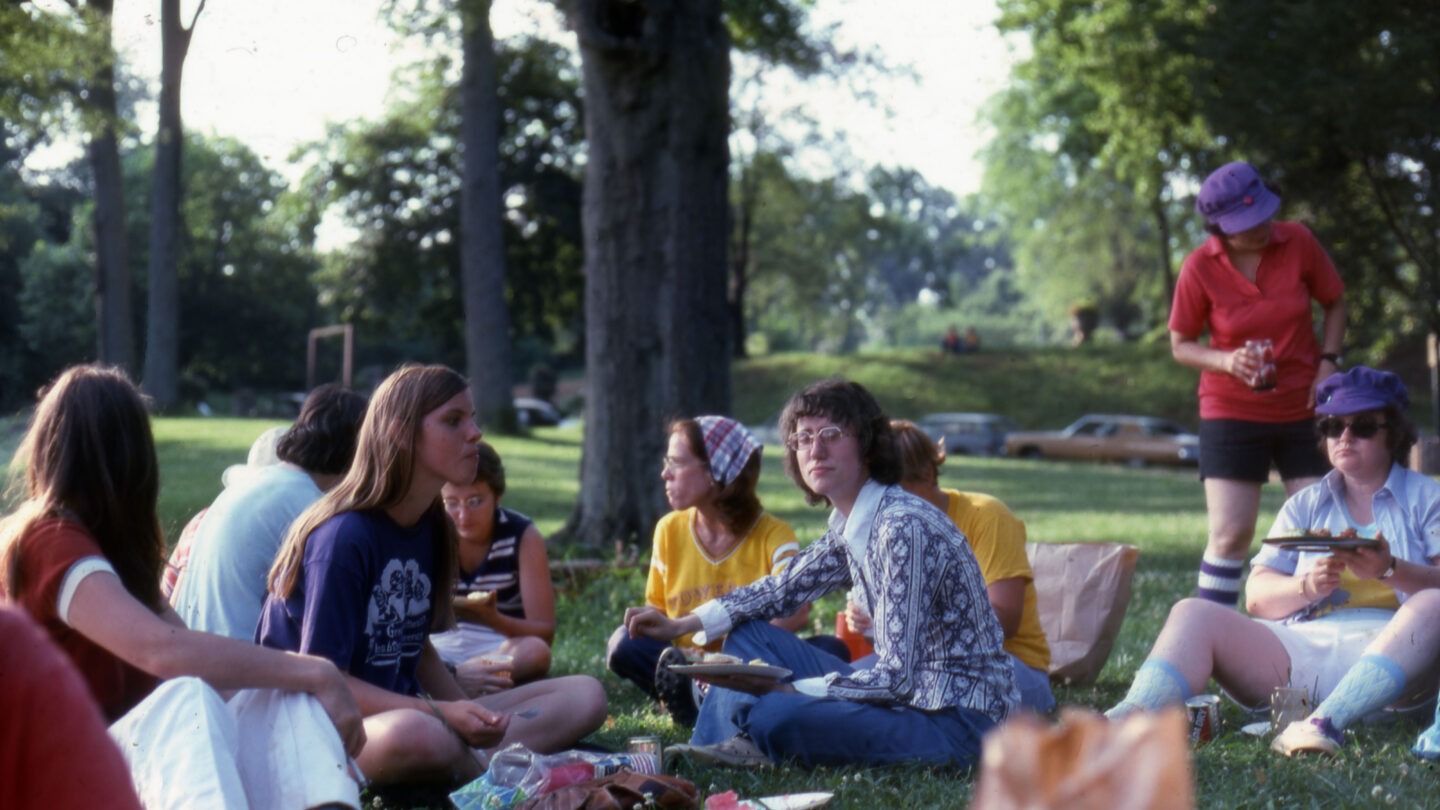
Equal Rights Amendment picnic, 1975, Frances A. Pici visual arts materials, VIS 418, Kenan Research Center at Atlanta History Center
While many of the organization’s goals were clear early on, there was still tension over how the group should conduct itself. For many, the issue of the group’s identity as a social versus political organization was of the utmost importance; for some, the organization’s focus was best set on building social lesbian spaces which were not inherently political; and to others, feminist activism was the most important action.
Another key issue at the forefront of ALFA’s early activism was the lack of representation of gay and lesbian identities in media. In 1972, members wrote to Ms. magazine requesting that the publication cover lesbian issues. In 1973 ALFA members picketed local newspapers for ignoring gay and lesbian events. To fill the void left by mainstream media, ALFA produced its own newsletter, Atalanta. The newsletter publicized local and regional events and activities, and reported on local, regional, and national news relevant to lesbians, as well as other gay people, feminists, and leftists. When ALFA established the Southern Feminist Library and Archives, Atalanta reported its acquisitions and holdings, making resources more accessible to lesbians looking for information.
Atalanta May 1978 cover. Courtesy Atlanta Lesbian Feminist Alliance
Print was foundational to ALFA, as it was to many lesbian-feminist organizations, but its ideology of lesbian-feminism was more often shared through theatrical performances by groups such as the Red Dyke Theatre and WomanSong Theatre, music, and all forms of social gatherings. But what really drew people to ALFA was softball.
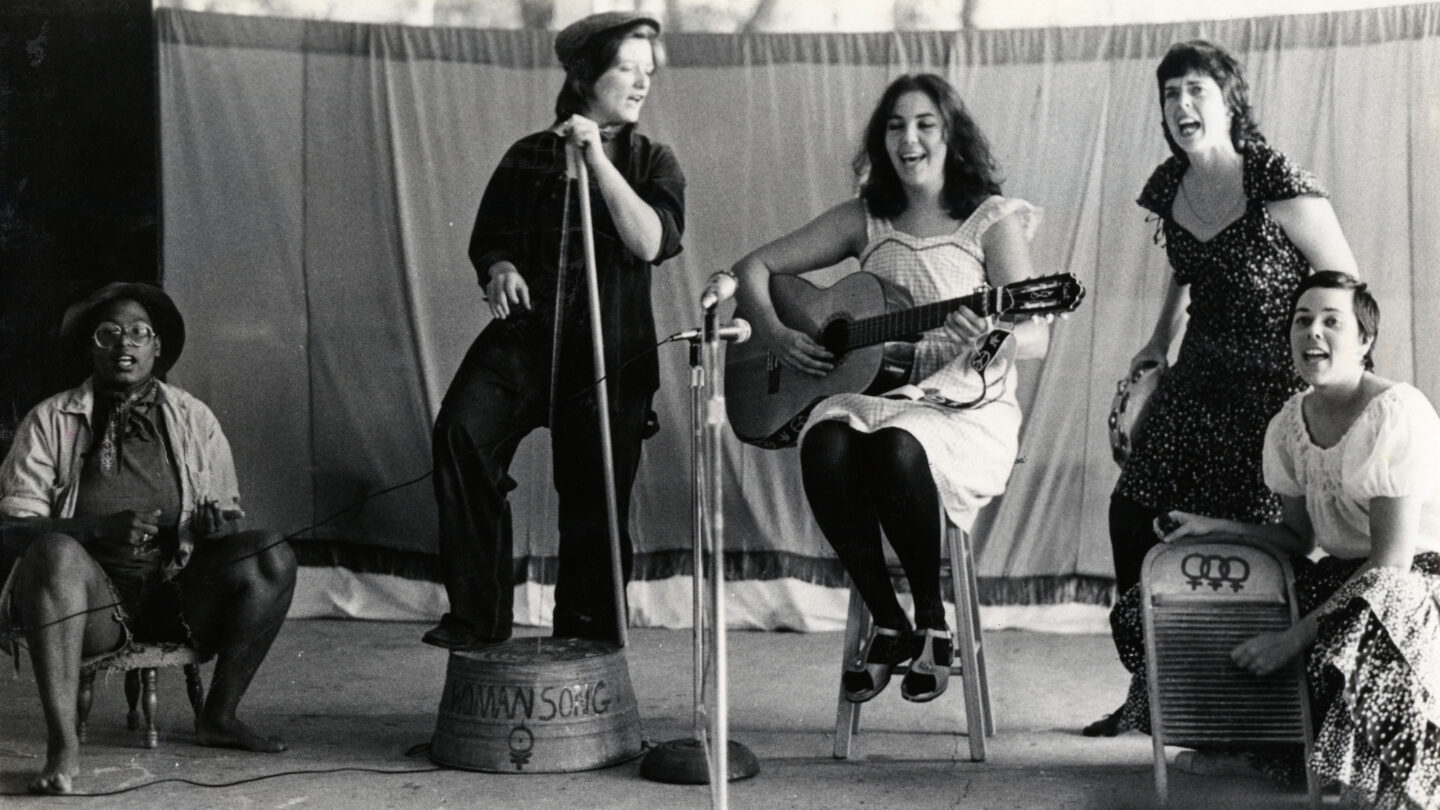
Parker, Pamela and WomanSong Theatre troupe performing at Piedmont Park, approximately 1970-1975, Pamela Parker photographs, VIS 413, Kenan Research Center at Atlanta History Center
ALFA established the ALFA Omegas in 1974, and entered the City League. The team’s approach was expressly egalitarian – any woman that wanted to play, regardless of skill, played. Play time was divided equally amongst all team members, so that no one was a benchwarmer. The ALFA Omegas did not have a male coach like other teams, instead creating the player-manager role in an effort to be truly egalitarian. The team’s focus was on community building and social interaction, rather than competition. More than anything, the ALFA Omegas were a place where lesbians could be out, with other lesbians, in a social context.
The softball team invited women that would not normally be active in political spaces to join ALFA and exist as out lesbians in public spaces. The team played in public parks throughout Atlanta, and as the team gained visibility, ALFA itself grew.
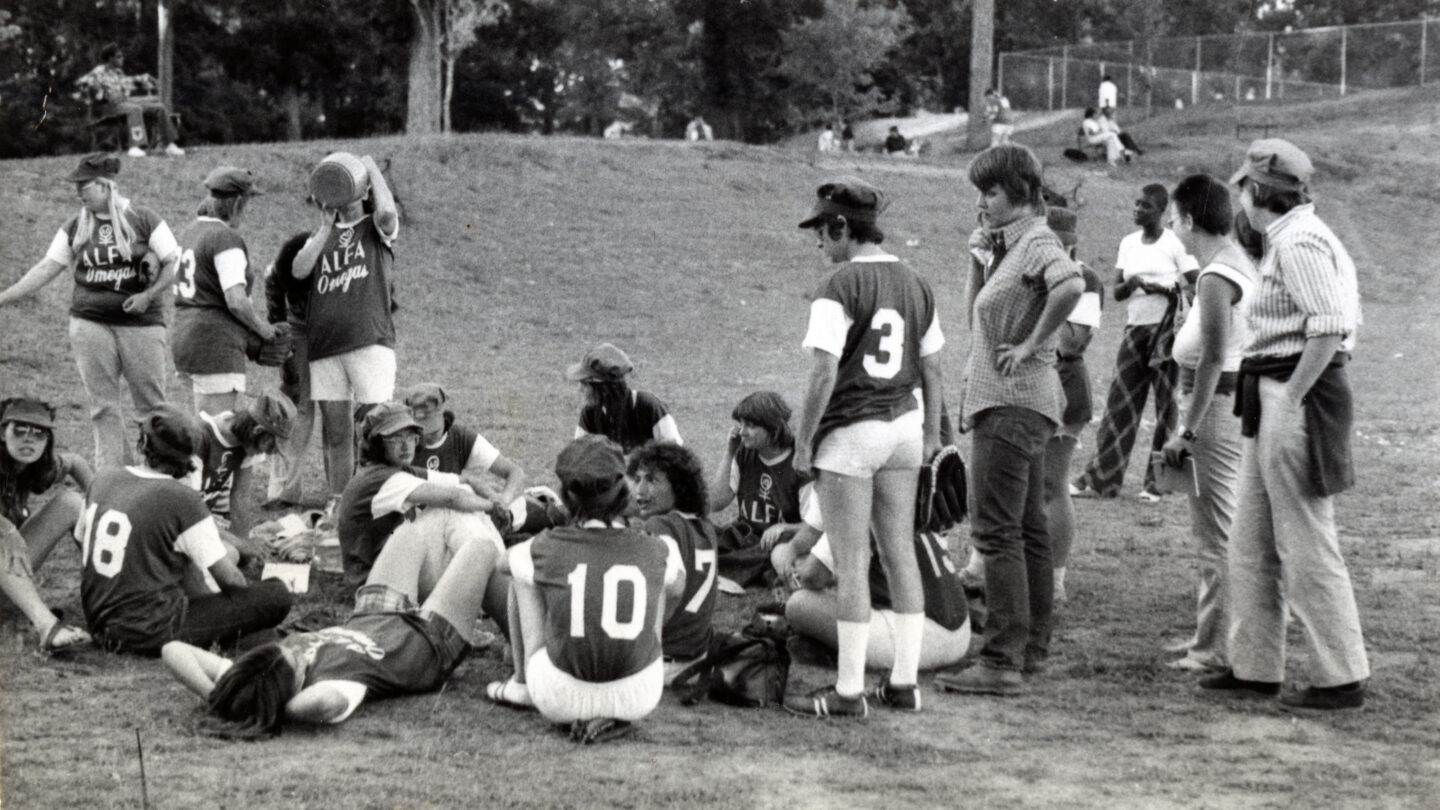
ALFA Omegas softball team, approximately 1974-1975, Pamela Parker photographs, VIS 413, Kenan Research Center at Atlanta History Center
In the year following the establishment of the ALFA Omegas, ALFA’s membership grew from roughly 30 to 100, with the organization peaking around 120 official members. Participation with the ALFA softball team increased so much that new softball teams were formed to accommodate the number of women signing up. This resulted in the formation of the ALFA Amazons and the Tower Hot Shots, which was sponsored by a local women’s bar but still considered and ALFA sister-out-lesbian team.
ALFA members also established a library and archive for preserving the print materials of the movement, the the Southern Feminist Library and Archives (SFLA). SFLA included the archival records of ALFA along with several other southern feminist groups; a collection of lesbian, feminist, and activist periodicals; and a library of feminist and lesbian books. The ALFA Periodicals Collection alone contains over 800 newsletter and journal titles. These periodicals covered a range of topics, including strictly lesbian and feminist publications as well as leftist activist publications.
ALFA continued functions throughout the 1980s, but by the 1990s it was struggling to maintain relevance as more lesbian and feminist organizations filled in the gaps once solely occupied by ALFA. In 1994, ALFA officially disbanded, giving the bulk of its archives and library to Duke University’s David M. Rubenstein Rare Book Manuscript Library and leaving behind a legacy as one of the longest functioning lesbian-feminist organizations in the United States.
ALFA closing announcement, May 1994. Courtesy Atlanta Lesbian Feminist Alliance
Today, many ALFA women, such as Lorraine Fontana, are still active in the LGBTQ+ community and reflects on how it has changed since early 1970s. Now, as Fontana observes, the community is more integrated, less exclusive than it was in 1972. In part for its own work, when ALFA disbanded in 1994 “what came later was diverse, more colorful and complete.”
The Kenan Research Center has recently processed several visual collections related LGBTQ+ history, which include photographs related to ALFA. They are now available to view by appointment, Tuesday through Saturday, 10:00 am – 5:00 pm at the Kenan Research Center:
VIS 409 | Alli Royce Soble photographs
VIS 411 | Dick Rhodes photographs of the Lesbian/Gay/Transperson Pride March
VIS 412 | Atlanta Lesbian and Gay History Thing visual arts materials
VIS 413 | Pamela Parker photographs
VIS 416 | Martin Padgett visual arts materials
VIS 417 | Liz Throop and B. Joy Wasson visual arts materials
VIS 418 | Frances A. Pici visual arts materials
VIS 419 | Billy Jones visual arts materials
VIS 420 | Richard Kavanaugh photographs
VIS 421 | Noel Lytle and David Mayersky photographs
VIS 422 | Gil Robison photographs
VIS 423 | Helena Maria Dolan photographs
